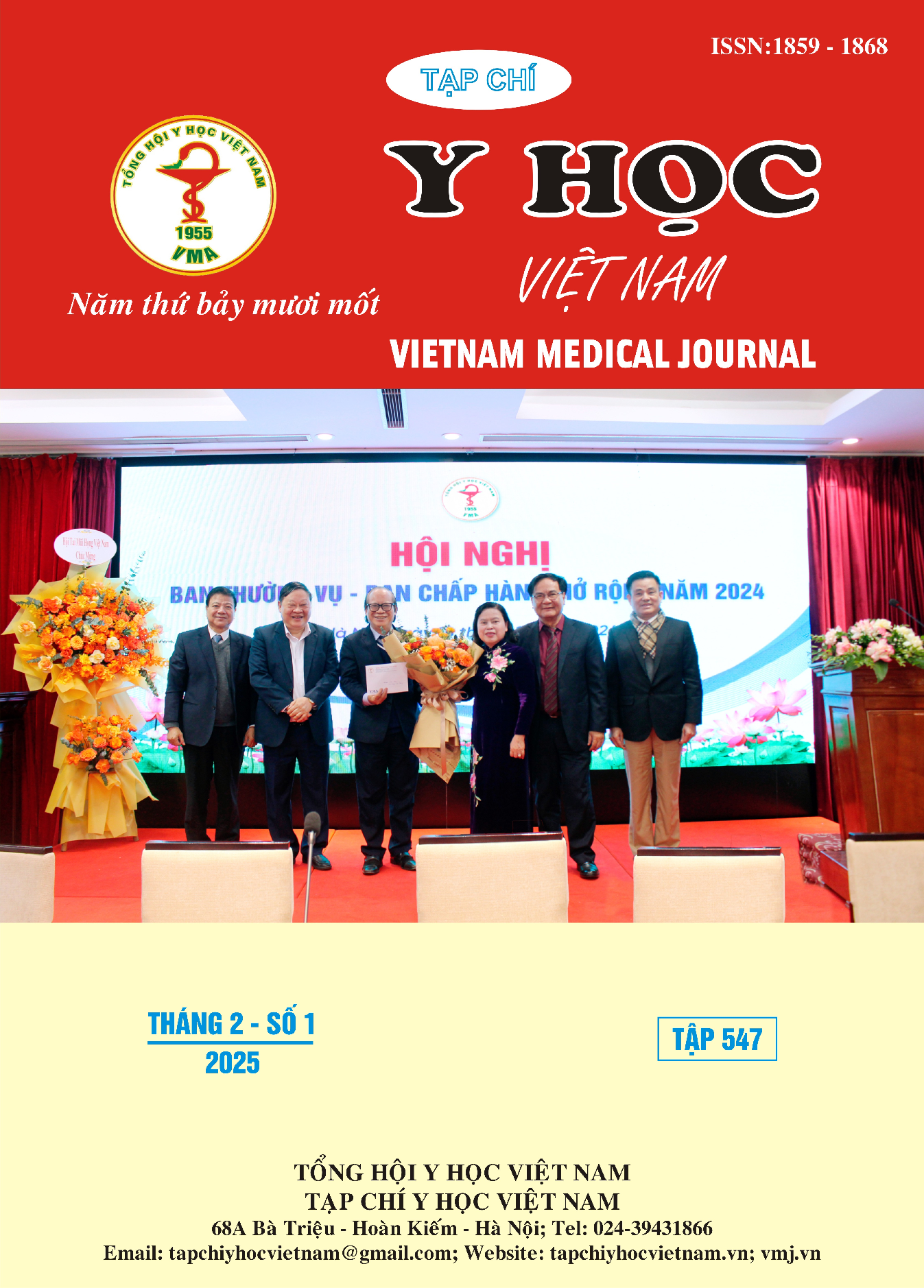RESULTS OF PREOPERATIVE CHEMORADIATION THERAPY FOR MIDDLE AND LOW RECTAL CANCER USING INTENSITY-MODULATED RADATION THERAPY
Main Article Content
Abstract
Objectives: To study clinicopathological characteristics of patients with middle and low rectal cancer who received preoperative intensity-modulated radiation therapy and evaluate the treatment results of these patient. Patients and method: A descriptive study of 47 middle and low rectal cancer patiens who were treated with IMRT plus Capecitabine preoperative from March 2021 to June 2024 at Hải Dương Province Hospital. Results: The male/female ratio was 1.6/1. The majority of patients were over 40 years old (95.7%), with the most common age group being 51-70 years old (63.9%). The main reason for hospitalization was bloody mucus in the stool (53.2%). The average time of disease detection was 4.68 ± 2.5 months. The common tumor morphology on endoscopy was the exophytic and ulceration-exophytic type, accounting for 93.6%. Moderately differentiated carcinoma accounted for the highest rate of 72.3%. Highly differentiated carcinoma accounted for 17.0% and poorly differentiated carcinoma was 10.7%. The average CEA concentration before treatment was 5.01±4.7ng/ml. The average CEA concentration after treatment was 3.1±1.6ng/ml. The decrease in CEA before and after treatment was statistically significant with p=0.048. The rate of sphincter-preserving surgery was 16.2%. Response on MRI: 59.6% of tumors decreased in T stage, the change was statistically significant (p<0.001). The rate of partial response on histopathology was 83.7%, the rate of complete response was 9.3%. The median disease-free survival was 25.9 ± 1.7 months. The earliest recurrence time for patients was 4 months, the highest was 31 months. The disease-free survival in stage II was higher than in stage III, the difference was statistically significant (p=0.032).
Article Details
Keywords
Rectal cancer, preoperative chemoradiotherapy, Intensity-modulated radiation therapy.
References
2. Nguyễn Văn Hiếu, Lê Văn Quảng và cộng sự. Đánh giá kết quả hóa xạ trị tiền phẫu trong ung thư trực tràng giai đoạn xâm lấn. Tạp chí khoa học công nghệ Việt Nam. 2018;60(2)
3. Phạm Khánh Toàn. Đánh giá kết quả hóa xạ trị tiền phẫu ung thư trực tràng bằng kỹ thuật xạ trị điều biến liều kết hợp Capecitabien đường uống tại Bệnh viện K. Luận văn chuyên khoa II. Đại học Y Hà Nội; 2022.
4. Nguyễn Thị Ngọc và cộng sự. Kết quả hóa xạ trị trước mổ ung thư trực tràng thấp giai đoạn II, III tại Bệnh viện Đà Nẵng. Tạp chí Y học Việt Nam. 2023;526(1A):19-23.
5. Trịnh Lê Huy. Kết quả hóa xạ trị tiền phẫu ung thư trực tràng giai đoạn II, III. Tạp chí Y học Việt Nam. 2022;514(1)
6. Võ Quốc Hưng. Kết quả điều trị ung thư trực tràng thấp, trung bình giai đoạn tiến triển tại chỗ bằng xạ trị gia tốc trước phẫu thuật kết hợp với Capecitabine. Luận án Tiến sỹ học. 2022;
7. Lee JW, Lee JH, Kim JG, et al. Comparison between preoperative and postoperative concurrent chemoradiotherapy for rectal cancer: an institutional analysis. Radiation oncology journal. Sep 2013;31(3):155-61. doi:10.3857/roj. 2013.31.3.155
8. Haggar FA, Boushey RP. Colorectal cancer epidemiology: incidence, mortality, survival, and risk factors. Clinics in colon and rectal surgery. Nov 2009; 22(4): 191-7. doi:10.1055/s-0029-1242458


